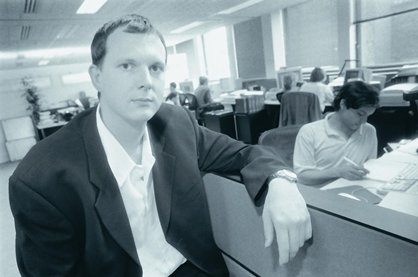Retro interview: Phil Harrison 13 years ago
We dig up Edge's post-PlayStation launch interview
Edge: Sony has deliberately targeted the non-videogame punter for the first part of its PlayStation advertising campaign. Is everyone really convinced that the massmarket consumer will be prepared to shell out £300 for a games machine?
PH: We’ve been spreading the message to a very wide audience – including all the games magazines. But it was a deliberate part of our strategy to reinvigorate the consumers who had moved away from games through boredom with the Sega and Nintendo market, and so we reached them though the style press. The main thrust of the advertising campaign will be truly massmarket. For the first time the technology can deliver an experience that will convert people who have previously resisted gaming as a leisure activity. Gaming is no longer a hobby or niche pursuit but a legitimate entertainment sector – alongside movies and music. The visual and audio quality of a PlayStation attracts so many more people to the concept of owning one. We have a PlayStation sitting in the reception of our office and its amazing how many people who have clearly never picked up a joystick in their lives are grinning insanely as they spin the car in Ridge Racer.
Many people who played games in the early 1980s who have either got bored or ‘grown out’ of their 16bit machines are tempted back by PlayStation. I test games on friends of mine who haven’t been into games for a few years who are staggered by the quality of what they see. They are immediately interested – particularly when they find out it’s 300 quid. They’d actually be prepared to pay more. I agree they are in jobs and have disposable income, but I’m also staggered by the amount of money people who are still at school will spend on a new pair of Nikes – over £100! Makes me sound old!
Edge: What is the PlayStation’s most dangerous rival – either now or in the foreseeable future?
PH: Our biggest rival is apathy in the market, not a single company or product. What’s important is that we’re not just trying to beat one company or another for short-term gain but the fact that we are seeking to reinvigorate the market. In terms of consumer spend we are fighting for the same £300 that could be spent on a mountain bike, a stereo or a couple of pairs of designer trainers. That’s where the real battle is – ensuring that PlayStation is seen as a quality product with longterm benefits by a mass market.

Edge: What solid reasons are there now for buying a PlayStation? What’s to stop people waiting for the Ultra 64?
PH: Tekken, Wipeout, Destruction Derby, Ridge Racer, Battle Arena Toh Shin Den, Mortal Kombat 3, Total NBA… There are seven good reasons between now and the end of 1995. And that’s a pretty impressive start by any standards. Obviously I’m biased, but Nintendo haven’t got proven technology to work yet and there are no games visible – there’s nothing to wait for!
Weekly digests, tales from the communities you love, and more
Edge: And 3DO? Do you think it can fight back with M2?
PH: No, not really. I don’t think the development community will listen the second time around. Without a pricing, software or marketing strategy, how can they compete? 3DO was launched in a tough market dominated by Sega and Nintendo. They showed that in order to be successful you need strength in many different areas: brand, marketing, software catalogue, technology, consumer price, manufacturing supply and retail trade support. If you lack one or more of these you seriously effect your chances.
Edge: What kind of lifespan can PlayStation owners expect from their machine?
PH: A long and happy one! We designed the machine to last – we are not intent on the obsolescence and self-destruction of something we’ve worked so hard to get right. The strength of the software in development will take us comfortably into the future.



